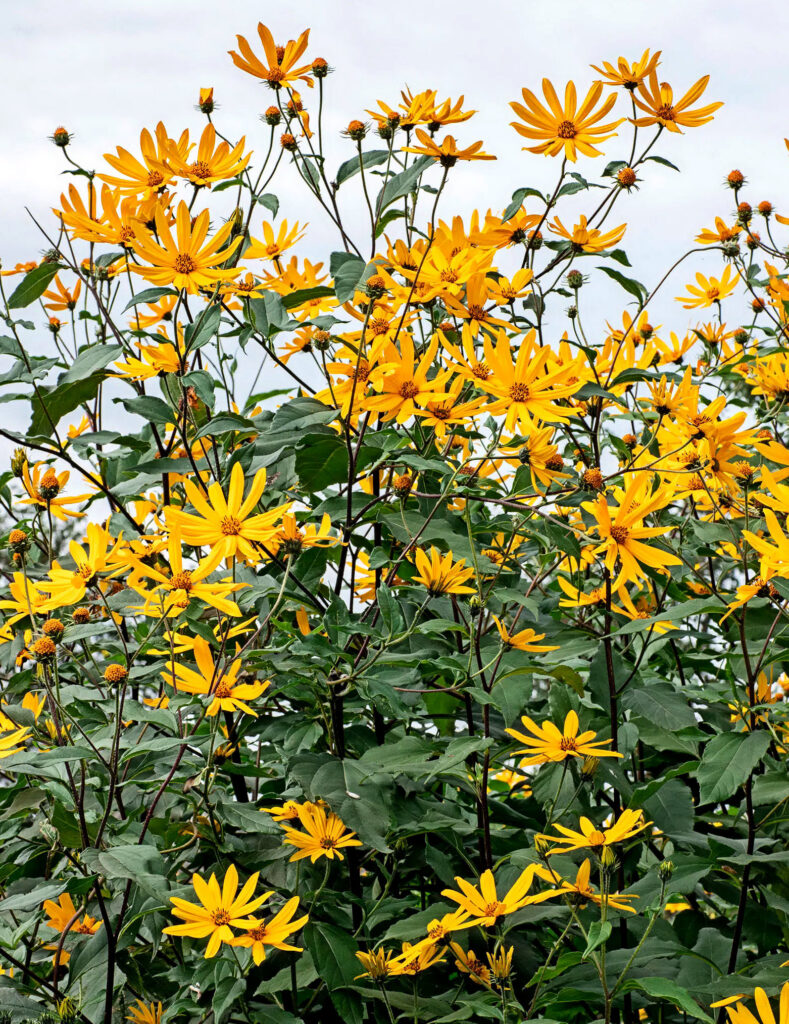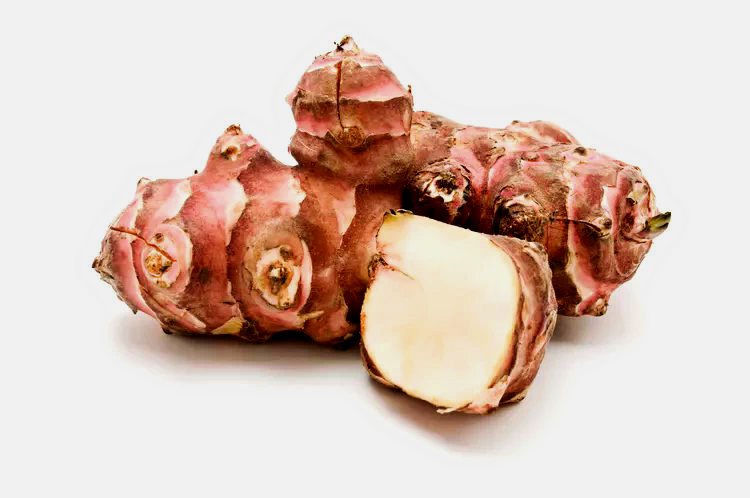Prince Edward County, Ontario, Canada
For a Change of Pace, Try Jerusalem Artichokes
Before the snow flies and the ground freezes, now would be a good time to dig up a few Jerusalem artichokes , (Helianthus tuberosus) if you have them in your garden, or know where some might be growing. For years, I grew them in our garden and always enjoyed munching on them raw.
I guess you can call it only barely a ‘wild’ edible. Like asparagus or mulberry, it exists in cultivation (for both food and biofuels in addition to its very popular use as a decorative garden flower) far more than it does in the wild.
I find they taste somewhat like a nutty-flavoured potato or maybe a water chestnut. They always made a good snack in my lunch pail when I used to work at Glenora Fisheries some 40 years ago, much to the chagrin of my fellow staff members. Being rich in fibre, they can cause gas and flatulence in people prone to having this type of disorder.

Here are some fun facts about Jerusalem artichokes:
- Contrary to the name, a Jerusalem artichoke is not a true artichoke though both are in the aster family. Actually this plant—also called a sunchoke, earth apple, and sunroot—is the part of the garden sunflower (not to be confused with the large sunflowers that produce the seeds people snack on) called a rhizome, which is found underground and stores the flower’s nutrients. The Jerusalem artichoke is also not from the Middle East or anywhere near Jerusalem, it’s actually a native species to North America.
- Native Americans harvested the Jerusalem artichoke to eat, and because it traveled and kept well, traded it among the tribes, and eventually, the settlers. Through this distribution, the Jerusalem artichoke was planted and harvested all over the country. When the Europeans came, they also took to the ingredient, spiriting it back home. Because the Jerusalem artichoke both tasted good and was easy to grow, it became popular in Europe, especially in France, where it’s still a common menu item today.
- In Germany they even make a booze from it called Rossler.
- Because they store carbohydrates as INULIN (not insulin) instead of starch, they are a good potato substitute for diabetics.
- The name Jerusalem artichoke probably came from the original settlers—the Italians to be exact—who called the plant girasole, Italian for sunflower. Over time the name got butchered by others until it became Jerusalem artichoke. Its name is a corruption of the Italian name “Girasola articiocco” which means ‘sunflower artichoke’ because Europeans thought that it tasted like artichoke.
- Sunchokes, the ‘new’ name for these tubers, are high in iron, potassium and thiamin
- If you wish to have a Jerusalem Artichoke-free garden, you may have to move. It is a pernicious weed, as are most plants that spread underground. It was many years before I could contain my Jerusalem artichokes to stay in a remote section of the garden.
- Artichokes contain inulin, a type of fiber which acts as a prebiotic
Besides eating them raw, or cooking them like potatoes, you can also make a delicious soup. Try this recipe sometime:

Jerusalem Artichoke Cheese Soup Recipe
- 1 pound Jerusalem artichokes
- 2 Tablespoons lemon juice
- 2 stalks celery
- 1 medium onion
- 6 Tablespoons butter
- 2-1/2 cups chicken broth
- 3 Tablespoons flour
- 1-1/2 cups medium-sharp Cheddar cheese
- 2 teaspoons dry mustard
- 1/2 cup cream
Here are some other options:
One great thing about these tubers is they can be used in many of the same ways potatoes can, but don’t have the same heavy starch to them (or any starch for that matter). Boil and mash the Jerusalem artichoke with butter and salt for a healthy side dish; or roast with olive oil until the skin gets tight and the insides creamy. Slicing thin and frying can produce a sweet and crunchy chip, though eating them raw is also an option as mentioned earlier. Try substituting the Jerusalem artichoke for potatoes in a breakfast hash, slice into coins for a cheesy gratin, or puree into a creamy soup, as described above. The only trick in working with this ingredient is scrubbing them clean and not worrying about all the irregularities—the knobs and skin are just part of the tuber and should remain.